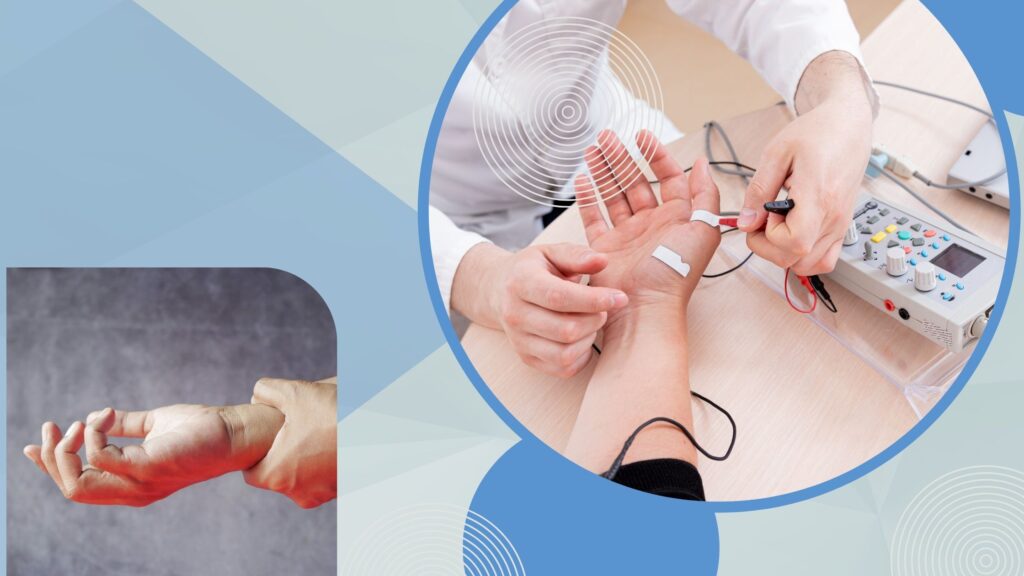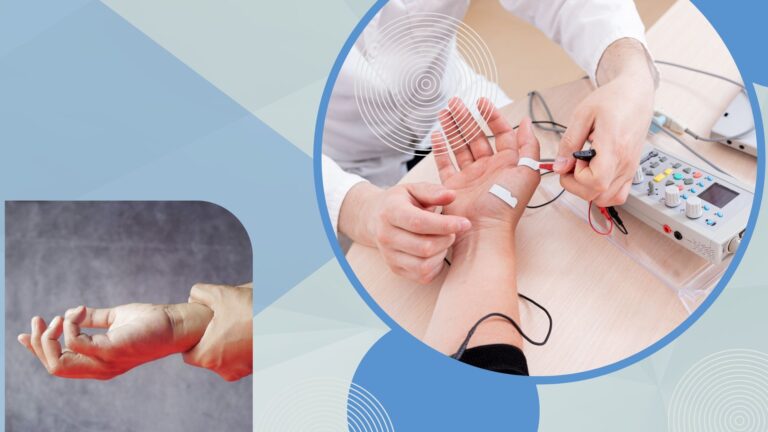When you’re noticing numbness, tingling, or other symptoms of a nerve disorder, it can feel disorienting and concerning. You want to consult with a doctor and speak with a neurologist about the onset of symptoms, the severity of the symptoms, and how you can treat them.
One of the first tests you will hear to help diagnose and create a treatment plan for a nerve disorder is a Nerve Conduction Test, or NCS, for Nerve Conduction Studies. An NCS helps diagnose and treat a wide variety of nerve problems, from localized numbness to sudden onset tingling.
Find out what to expect during your nerve conduction study, what a nerve conduction test diagnoses, and how you can work with your neurologist moving forward.
Need a Nerve Conduction Study in Maryland?
Contact Neurological Medicine PA, with two locations offering NCS: Laurel and Greenbelt. We are a 5-star-rated neurological practice that can help diagnose, treat, and manage nerve disorders and other neurological conditions.
Note: Content on neuromedpa.com is not doctor’s advice and should not be taken as such. Always contact your primary care doctor for medical services, diagnosis, treatment, and more.
What is a Nerve Conduction Study
A nerve conduction study tests the response time of the nerves and the sensitivity of the nerves when responding to stimulation.
A nerve conduction test is completed by placing electrodes over the nerves that are being tested. These are often small circular pads that adhere to the skin, similar to a bandage. The electrodes will send a mild electrical pulse, or stimulation, through to the nerves. A recording electrode will monitor how long it takes for the nerve to register the stimulation.
At the end, your NCS will provide data on how long it took the stimulation to travel, recording the responsiveness and sensitivity of your nerves. This will help your doctor identify which nerves are having responsive issues and which areas are being affected.

What Does a Nerve Conduction Study Diagnose
A nerve conduction study will help diagnose the cause of nerve damage, nerve blocks, or other numbness and tingling related to nerve sensitivity.
Finding the Cause of Symptoms
You may request or be referred for a nerve conduction study because you are noticing nerve symptoms that are affecting your quality of life. An NCS can diagnose the underlying cause, whether it is from an injury or disorder, to help treat the source to alleviate the symptoms.
- Muscle pain
- Muscle weakness
- Numbness or tingling
- Loss of sensation in extremities and limbs
- Decreased muscle function
- Muscle cramping
- Feelings of electric shocks
- Change in response to hot/cold temperatures
Nerve Disorders and Conditions
A nerve conduction test can diagnose a wide range of nerve disorders and issues. You may expect to hear about chronic conditions, treatment for nerve pain, or symptoms that will be managed. Your neurologist will review your diagnosis with you, the onset and cause, and what treatment options are available moving forward.
- Peripheral Neuropathy
- Nerve Compression Syndromes
- Carpal Tunnel Syndrome
- Sciatica
- Myopathy
- Bells palsy
- Guillain-Barré syndrome
- Charcot-Marie-Tooth disease
- Chronic inflammatory neuropathy
- Polyneuropathy
- Diabetic neuropathy
- Myasthenia gravis
- Herniated disk
Providing Data for Treatment
A nerve conduction study will also help shape your treatment plan. A diagnosis alone is a wonderful resource, but knowing exactly how your nerves are responding to stimulation is valuable information.
Your doctor may refer you to a neurologist for follow-up testing even after a diagnosis to help with treatment options. Treatment options for nerve conditions may include medications, physical therapy, dietary changes, and more. Continually monitoring your body’s responses to stimulation will help track your condition and better understand how your body responds to treatment plans.
Never be afraid to ask your neurologist about your results, how your nerves are progressing, and what options you have available to you. A nerve conduction study is only one test in diagnosing and treating nerve disorders.

What Happens Next
You don’t need to stress about what happens after your nerve conduction study. Your neurologist and primary care doctor will discuss treatment options with you, the details of the diagnosis, and what lifestyle changes (if any) need to be made.
While a nerve conduction test can diagnose many disorders or nerve issues, there are always a dozen different results a patient could be facing. Discussing symptoms with your doctor is the best way to get an answer tailored to what you are going through.
Schedule a Nerve Conduction Study in Maryland
Neurological Medicine PA is happy to help patients who are looking for answers. You may be asking, “What can a nerve conduction study diagnose?” and the answer is it can diagnose the underlying cause of your symptoms and provide valuable information for treatment moving forward.
Whether you’re looking at carpal tunnel syndrome or a chronic condition, help and treatment options are available. Get answers, find solutions, and live a healthier, pain-free life. With two locations in Maryland, we are here to help serve you better. Let’s get started.
FAQ
What is a Nerve Conduction Study (NCS)?
A Nerve Conduction Study is a diagnostic test that measures how quickly and effectively your nerves respond to mild electrical stimulation. Electrodes are placed on your skin to send and record signals, helping identify nerve function and sensitivity.
What conditions can a Nerve Conduction Test diagnose?
A Nerve Conduction Test can diagnose various nerve disorders, including Peripheral Neuropathy, Carpal Tunnel Syndrome, Sciatica, Bell’s Palsy, Guillain-Barré Syndrome, Diabetic Neuropathy, Myopathy, and Nerve Compression Syndromes.
Why would my doctor recommend a Nerve Conduction Study?
Your doctor may recommend a Nerve Conduction Study if you experience symptoms like numbness, tingling, muscle weakness, cramping, loss of sensation, or pain. The test helps determine if these issues stem from nerve damage or a specific disorder.
How does a Nerve Conduction Study help with treatment?
The test provides valuable data on how your nerves respond to stimulation. This information helps your neurologist design a personalized treatment plan, which may include medications, physical therapy, or lifestyle changes to manage your condition.
Where can I schedule a Nerve Conduction Study in Maryland?
You can schedule a Nerve Conduction Study at Neurological Medicine PA, which offers NCS testing at two Maryland locations—Laurel and Greenbelt. Our 5-star-rated neurologists specialize in diagnosing and managing nerve and neurological disorders.

Neurological Medicine, P.A.
Neurological Medicine, P.A., provides comprehensive diagnostic and treatment services to patients with conditions affecting the brain, spinal cord, nerves, and muscles. We have been serving the Prince George’s and Montgomery County area since 1975, with two offices: Greenbelt and Laurel. We offer complete adult neurological care as well as in-office neurodiagnostic studies.
- Neurological Medicine, P.A.
- Neurological Medicine, P.A.
- Neurological Medicine, P.A.
- Neurological Medicine, P.A.



